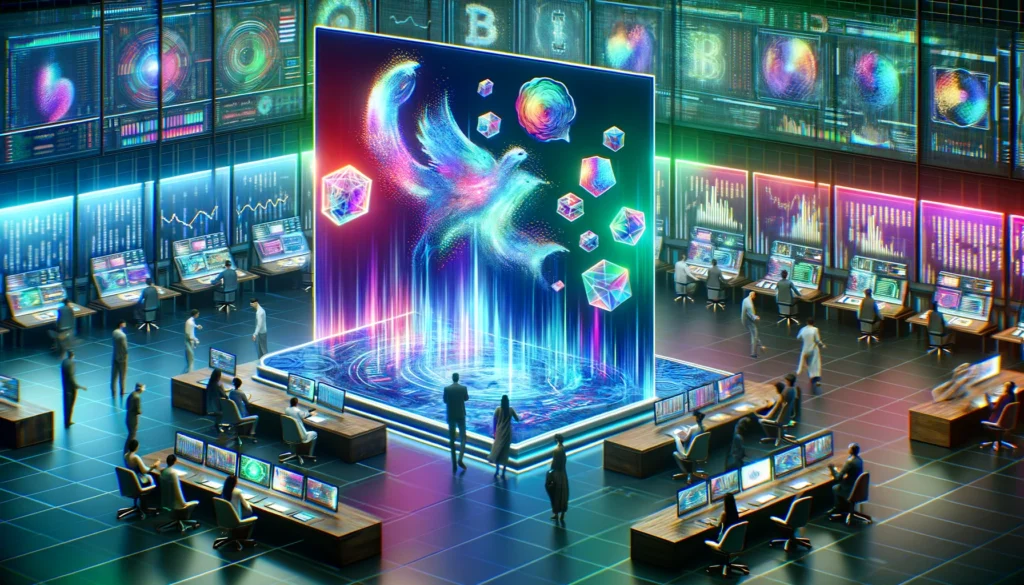In the world of cryptocurrency, one of the most intriguing and rapidly growing areas are the Non-Fungible Tokens. NFTs, unique digital assets verified using blockchain technology, have transformed the way we think about art, ownership, and digital expression. Lets explore how NFT marketplaces work, how to navigate them safely, and how to make informed decisions.
Understanding NFTs and Their Marketplaces
NFTs are more than just digital art, they represent a new frontier in the ownership and trading of unique digital assets. An NFT can be anything digital, from artwork and music to tweets and virtual real estate. But what makes them truly unique is their indivisibility and inability to be exchanged on a one-to-one basis, unlike cryptocurrencies.
Definition of NFTs
At their core, NFTs are digital tokens that represent ownership of a unique item or asset, backed by blockchain technology. Unlike cryptocurrencies like Bitcoin or Ethereum, which are fungible and can be exchanged on a one-to-one basis, each NFT has a distinct value and cannot be exchanged like-for-like. This uniqueness is what gives NFTs their value and appeal.
Importance of NFT Marketplaces
NFT marketplaces are the platforms where these unique digital assets are bought, sold, or traded. They are the digital equivalent of art galleries or auction houses in the physical world. These platforms not only facilitate the buying and selling of NFTs but also often provide additional services like minting, where creators can convert their digital works into NFTs.
Understanding how NFT marketplaces operate is essential for anyone looking to engage in the trading of these digital assets. These platforms are more than just venues for buying and selling, they are ecosystems that support the creation, verification, and trading of NFTs.
Choosing the Right NFT Marketplace
With a plethora of NFT marketplaces available, it’s crucial to choose one that aligns with your interests and needs. Each marketplace has its unique features, audience, and types of NFTs available.
When selecting an NFT marketplace, consider the following:
- Fees: Understand the fee structure, including listing fees and transaction commissions, as they can vary significantly between platforms.
- User Interface: A user-friendly and intuitive interface is crucial, especially for beginners in the NFT space.
- Supported Assets: Different marketplaces specialize in different types of NFTs, such as art, music, virtual real estate, or collectibles.
- Security: Evaluate the security measures in place, such as wallet protection and transaction verification processes.
- Community and Support: A vibrant community and robust customer support can significantly enhance your trading experience.
Popular NFT Marketplaces
Some of the most popular NFT marketplaces include:
- OpenSea: Known for its vast collection and diversity of NFTs, suitable for both beginners and experienced traders.
- Rarible: A decentralized marketplace that offers a unique governance model, allowing users to vote on platform decisions.
- SuperRare: Focuses on high-end, single-edition digital art, attracting serious collectors and artists.
Getting Started with NFT Trading

For newcomers to the NFT space, understanding the basic steps of engaging in NFT trading is crucial. This section outlines how to get started, from setting up your wallet to making your first purchase or sale.
Decentralized Verification: The blockchain acts as a decentralized ledger that verifies the uniqueness and ownership of each NFT. This technology ensures that every NFT is one-of-a-kind and cannot be replicated or counterfeited.
Smart Contracts: When an NFT is created, or ‘minted,’ it is accompanied by a smart contract. This self-executing contract contains the terms of the sale, including royalties for the original creator, which are automatically enforced by the blockchain. This feature allows artists and creators to continue earning from their work even after the initial sale.
Buying and Selling: Transactions in NFT marketplaces can take the form of auctions or fixed-price sales. Buyers can browse collections, place bids, or purchase NFTs outright. Once a transaction is completed, the ownership of the NFT is transferred to the buyer’s blockchain address, ensuring a secure and transparent transfer of ownership.
Setting Up a Digital Wallet
Before diving into the world of NFT trading, you need a digital wallet. This wallet can hold both your cryptocurrency and any NFTs you acquire.
- Choosing a Wallet: Opt for wallets compatible with the blockchain of your chosen NFT marketplace, usually Ethereum. MetaMask, Trust Wallet, and Coinbase Wallet are popular choices.
- Installation and Setup: Follow the provider’s instructions to install and set up your wallet. This will typically include creating a secure password and noting down a recovery phrase.
- Security: Store your recovery phrase safely and consider additional security measures like hardware wallets or two-factor authentication.
Buying and Selling NFTs
With your wallet ready, you can start exploring NFT marketplaces to buy or sell NFTs.
- Buying NFTs: Research the marketplace for NFTs that interest you. Pay attention to the creator’s reputation, the rarity, and the overall demand for the piece. When you find something you like, follow the marketplace’s process to complete your purchase.
- Selling NFTs: If you have digital art or other items you want to turn into NFTs, you can list them on a marketplace. Set a price or opt for an auction. Clear descriptions and high-quality images can help attract buyers.
- Transaction Process: Once a sale is agreed upon, the NFT is transferred to the buyer’s wallet, and the seller receives the payment in cryptocurrency. Be aware of any transaction fees and the time it might take for the transaction to process on the blockchain.
Safety and Security in NFT Transactions
Engaging in NFT transactions requires an awareness of potential risks and an understanding of how to protect your assets.
Identifying and Avoiding Scams
Stay vigilant against common scams in the NFT space:
- Phishing Attacks: Be cautious of emails or websites asking for your wallet credentials. Always verify the source before entering any sensitive information.
- Counterfeit NFTs: Some scammers may sell fake or copied NFTs. Verify the authenticity of the NFT and the credibility of the seller.
- Pump-and-Dump Schemes: Be wary of artificially inflated NFT prices. Research thoroughly before investing in trending NFTs.
Best Practices for Secure Trading
To ensure a secure NFT trading experience, consider the following:
- Use Reputable Marketplaces: Stick to well-known and reputable NFT platforms.
- Secure Your Wallet: Regularly update your wallet’s security settings and back it up.
- Stay Informed: Keep abreast of the latest security measures in the NFT space and apply them.
- Diversify Your Investments: Avoid putting all your funds into a single NFT or digital asset.
Future Trends in NFT Marketplaces
As we look towards the future, it’s evident that NFT marketplaces will continue to evolve, driven by advancements in technology and shifts in user demand. Understanding these trends is crucial for anyone looking to remain engaged in the NFT space.
Emerging Technologies
Blockchain technology is rapidly evolving, and with it, the capabilities of NFTs are expanding. Look for developments in areas like:
- Interoperability: Efforts to enhance cross-chain transactions will make NFTs more accessible across different blockchain platforms.
- Enhanced Security: As the market grows, so does the focus on advanced security measures to protect NFT assets and transactions.
- Virtual and Augmented Reality: The integration of NFTs with VR and AR technologies is expected to create more immersive and interactive digital experiences.
Market Predictions
The NFT market is still in its early stages, and as it matures, several trends are likely to shape its future:
- Diversification of Assets: Expect to see a broader range of NFTs, including more offerings in music, literature, and virtual experiences.
- Increased Institutional Interest: As the market grows, more businesses and institutions are likely to enter the NFT space, bringing with them new opportunities and challenges.
- Regulatory Developments: With the increasing popularity of NFTs, regulatory frameworks are expected to develop, potentially impacting how NFT marketplaces operate.
Conclusion
NFT marketplaces offer a fascinating intersection of technology, art, and commerce. For new cryptocurrency traders, navigating this space can be both exhilarating and overwhelming. This guide has aimed to provide a comprehensive overview of NFT marketplaces, from the basics of setting up a digital wallet to understanding future trends in the industry.
As you embark on your NFT journey, remember the importance of research, due diligence, and staying informed about the latest developments in the space. Whether you’re a creator, collector, or trader, the world of NFTs offers a unique opportunity to engage with digital assets in a way that was not possible before.

